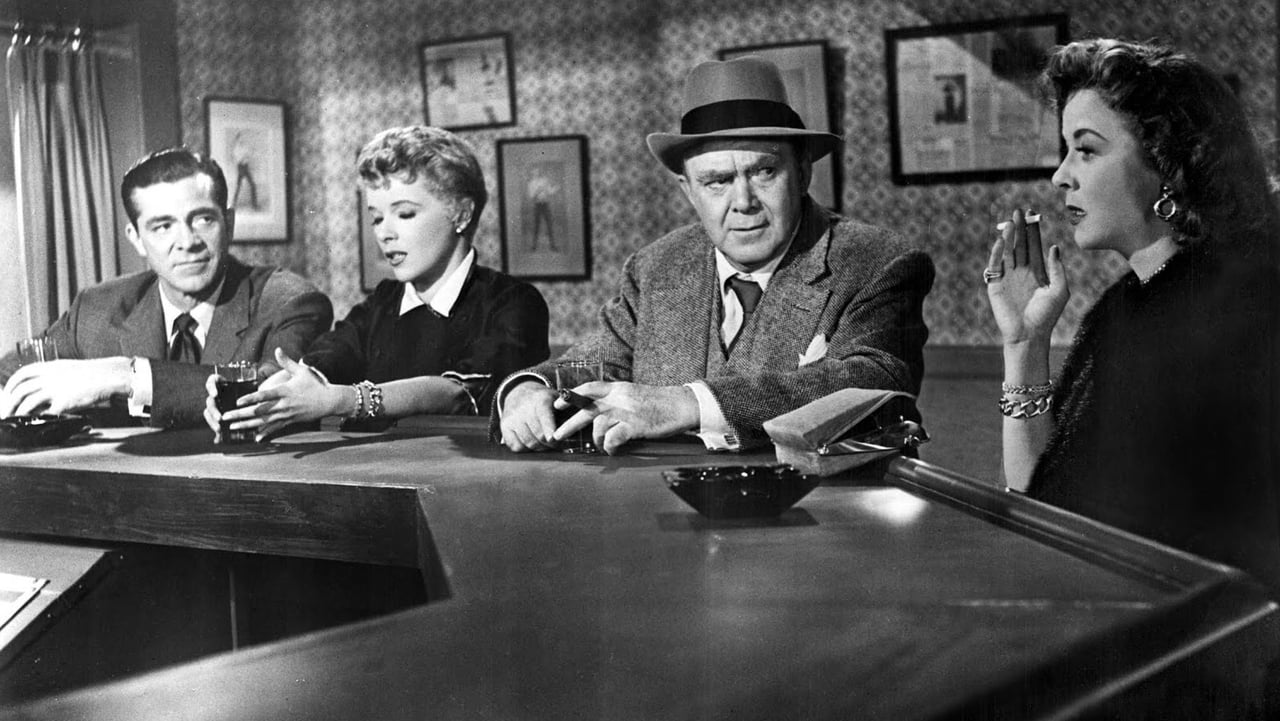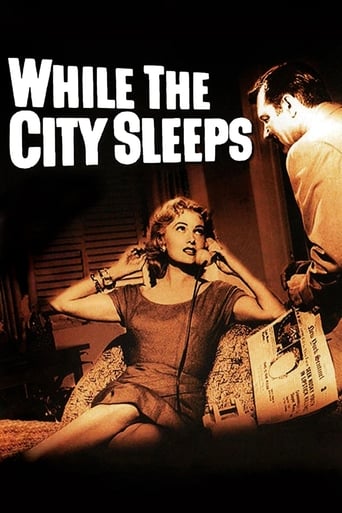

De gustibus non est disputandum...Taste is not a matter for argument. The great director's next-to-last American-made movie is either a fine example of the man's social criticism or a tedious melodrama. Review "numbers" that we amateur critics have given the film range from a barely watchable 4 to an enthusiastic 10. Talk about a lack of consensus.The twin plot lines concern a fight over management of a news media empire and the hunt for a young male serial murderer of attractive women. The element connecting the two is the contest among executives set up by the callow new owner of the company, the ne'er do well son of the hard-working founder. The "contest" offers the position of second-in-command to the newsman who solves the mystery of the murderer.The newsmen are a mixture of high-mindedness and venality, genuine romance and shabby use of women. I don't have a clue as to the background of my fellow reviewers, so I can't say why some found insightfulness in Lang's portrayal of a modern news media company while others, such as this reviewer, saw nothing beyond the obvious. It was the longer scenes between male and female that proved hardest for me to watch, and not because Lang was making an unpleasant point. To be blunt, the scenes seemed ridiculous. We've all seen films with lots of snappy dialogue between men and women, in which realism takes a back seat to cleverness. There's nothing snappy in these scenes.If one is curious, one might want to watch this movie to see how unfamiliarity with the everyday behavior of people from a different culture than a director's own distorts the director's attempt to produce realistic scenes.
... View MoreDirected by Fritz Lang, with a screenplay by Casey Robinson, this slightly above average crime drama, behind the scenes media expose features an all star cast that includes Dana Andrews, Rhonda Fleming, George Sanders, Howard Duff, Thomas Mitchell, Vincent Price, James Craig, Ida Lupino, and Robert Warwick, among others.It's interesting to see how the media and police worked together in the mid-50's vs. at cross purposes (it seems) these days. More relevant to today is the storyline about different media branches within the same news organization (print, television, and wire) competing against each other to be first with the story, or for exclusives. This film is probably ripe for a remake given the explosion of the Internet. Also, the criminal profiling that Andrews's and Duff's characters do, though not seminal, is interesting even if it is taken to incredible extremes late in the movie.Amos Kyne (Warwick), the head of a media conglomerate, dies, leaving his spoiled, almost maniacal son Walter (Price) in charge of it. Walter decides it would be a good idea to establish an executive position to run things for him; he'll pick one of the heads of the organization's main departments for the job. This means news-wire head Mark Loving (Sanders), newspaper head John Day Griffith (Mitchell), and news pictures chief Harry Kritzer (Craig) must compete for it.Edward Mobley (Andrews), the Pulitzer Prize winning author who heads television news, refuses to participate. Walter has a chip on his shoulder about Mobley anyway since his father had been grooming him for the job even though Mobley lacked the ambition and/or didn't want the responsibility. As luck would have it, just before Kyne's death, a major story broke - a murder of an attractive young woman was committed whereby the killer wrote "ask mother" in lipstick on the wall of her apartment. Walter makes it clear that solving this crime will be a major feather in the cap of the man that does, as far as this new executive position is concerned.All this is happening at the same time that Mobley has finally popped the question to Loving's secretary Nancy Liggett (Sally Forrest). Both Loving and Griffith vie for assistance from Mobley, who has good contacts within the police department like Lieutenant Burt Kaufman (Duff), while 'honest' (?) Harry plans to lie low and use Kyne's wife Dorothy (Fleming), with whom he's having an affair, as his inside track to the job. Loving is willing to stoop pretty low himself, using his main squeeze, female reporter Mildred Donner (Lupino), to seduce Mobley into helping him. Ralph Peters appears as one of Griffith's reporters; Joe Devlin (uncredited) as another on his staff.Meanwhile, we see the murderer, dubbed the lipstick killer (John Drew Barrymore; yes, John Barrymore Jr.) fits the profile description Mobley reads on the air - a 20 year old "boy" with perverse ideas about male-female relationships that still lives with his "unloving" mother (Mae Marsh).Unfortunately, a few too many coincidences (like the fact that Kritzer's apartment is across the hall from Liggett's), the suddenly razor sharp analysis and too conveniently timed second Mobley- Kaufman profiling luncheon followed by a fairly lame chase, the sub- par Mobley-Liggett "romance" plot-line (esp. the off-key comic relief elements) detract from what would otherwise be an above average film.Of course, a modern viewer has to be careful not to be jaded by the more current crime films "he's" seen, else his enjoyment of this one would be even less.
... View More"While the City Sleeps" may be Lang's second favorite U.S. film but I still think it's rather dull. There is very little action — even the climactic chase through the subway is not all that exciting — and a great deal of talk. The characters never fully engage the interest and very little suspense is worked up despite a two-pronged plot, combining the thriller with "Executive Suite".Dana Andrews plays in his usual glum style, James Craig is even glummer, Sanders and Mitchell give their usual characterizations, while Ida Lupino overplays the femme fatale bit and Rhonda Fleming makes a good-looking but unconvincing adulteress. Barrymore overplays as usual. The only surprise and only performance to make any impression is Vincent Price as a callow newspaper heir.Amazingly, after Moonfleet which is superlatively composed, Lang handles the wide screen very flaccidly, the loose framing matching the lack of tautness in the plot. Most of the lighting is flat too, though an occasional shot of rich contrast shows what the film might have been had Lang been at the top of his form. Production values are also no more than average, with the same unattractive sets being used again and again. Music and other technical credits are equally undistinguished.
... View MoreFritz Lang's Hollywood career was almost ending in 1956. His choice to direct this film will baffle anyone that has followed the master's career from his early days in Germany. The picture marked almost the end of his involvement in the American cinema for he only directed "Beyond a Reasonable Doubt" after this one, then left for Germany.The film combines two subjects that were close to Mr. Lang's heart, crime, and the way he perceived the empowerment of the news media in the country. We suspect the inspiration for this film might have been CBS, one of the most powerful networks in the land, and his star correspondent, Edward R. Morrow, a figure that might have influenced his own take on Edward Mobley, the television newscaster that is the clear favorite of the founder of the empire, Amos Kyne.The film combines the newspaper drama with that of a serial killer, an event that occupies the front page and the leading piece in Mobley's telecast. As Amos Kyne dies, there is a power struggle trying to be selected as the successor to the founder. The weak son of the late Amos Kyne, Walter, is the one to call the shots, as whom will be in charge of the media corporation, while the killer gets involved in the story in curious ways.The film gathered enough talent to make it commercially viable. Dana Andrews, with his good looks, was the perfect choice to play Mobley. The ensemble cast was wonderful because it brought together George Sanders, Thomas Mitchell, Ida Lupino, Vincent Price, Rhonda Fleming, and the menacing John Drew Barrymore Jr. to give the director a satisfying film.The only puzzling sequence involves a supposedly subway chase with a Los Angeles setting, something that clearly did not make much sense for those that realized the conflict of sites.
... View More